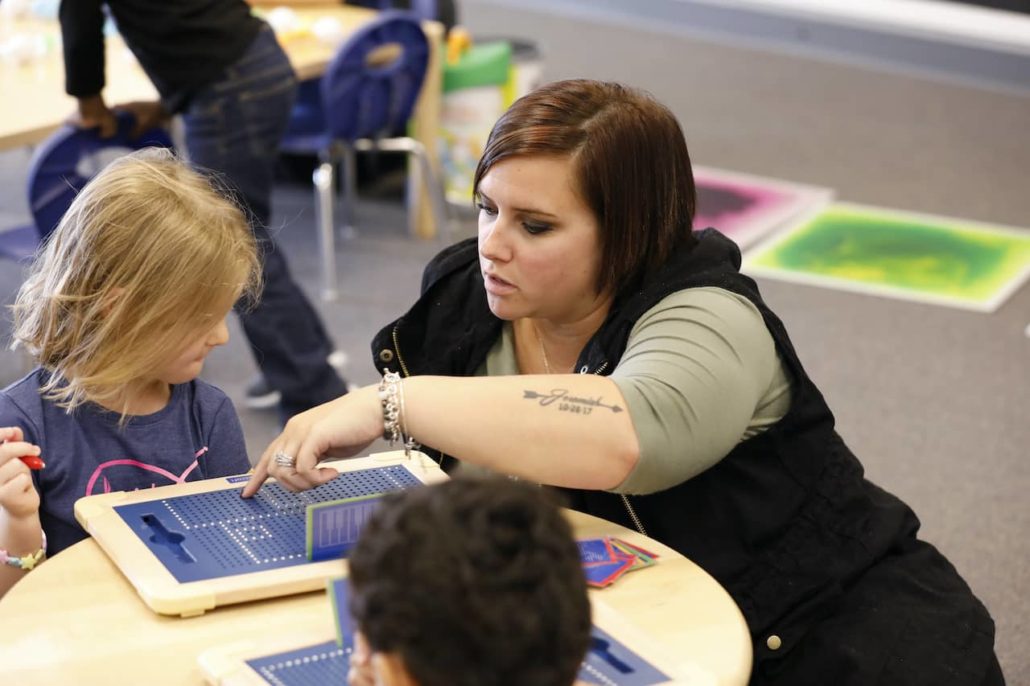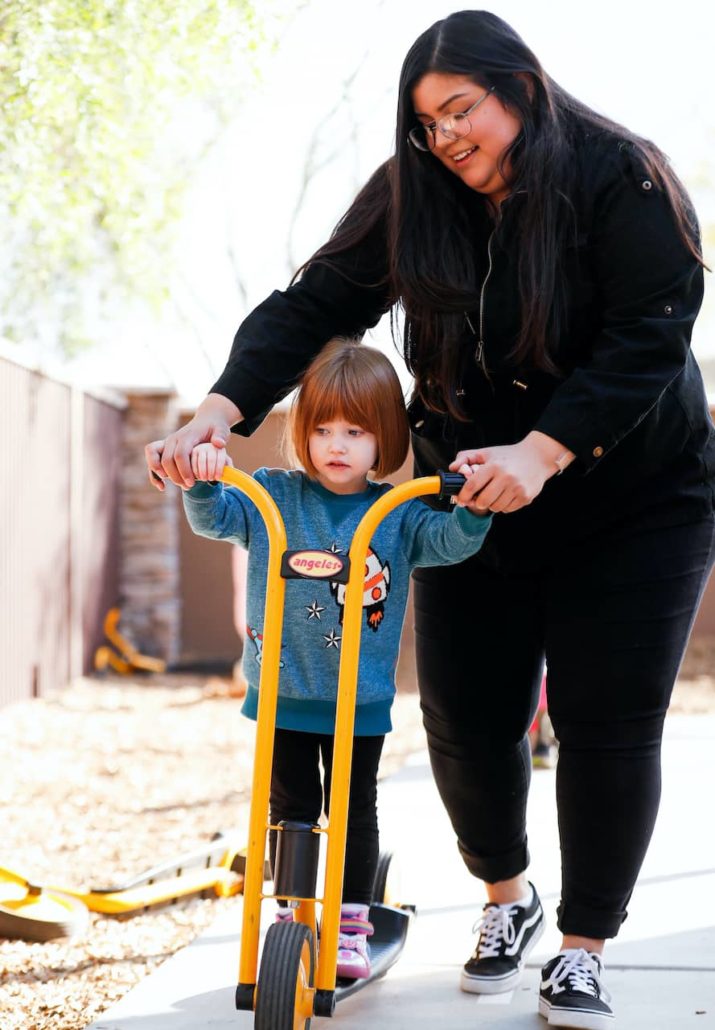Parenthood can sometimes seem like a series of experiments designed to test your patience, resilience, and emotional bandwidth. Learning about different parenting styles and techniques will equip you with the skills to navigate each challenge to your best ability.
Whether you are well into parenthood and desperate for a change or are bright-eyed and bushy-tailed ready to embark on your journey, positive parenting skills can be beneficial for children and families of all stages.
The concept of positive parenting is based upon the notion that children deserve to be treated with dignity and respect. By setting clear expectations with compassionate communication, you will empower your child to explore, learn, and grow.
Just remember that no matter how prepared you may feel, mistakes and missteps are bound to happen — and that’s okay because you’re still human, and you’re still doing your best!
To help you put your most knowledgeable foot forward, we’ve compiled this comprehensive guide covering the basics of positive reinforcement parenting and some tried and true positive parenting tips and techniques.
Positive Parenting: What to Know

What is Positive Parenting?
The concept of positive parenting derives from the work of Alfred Adler, a psychologist in the 1920’s. Adler held the belief that children deserved to be treated with dignity and respect. While his theory was considered progressive at the time, it has since become widely accepted as a highly effective approach to parenting and discipline.
Adler believed that when treated with respect and empathy, children are encouraged to make choices that reflect confidence in their abilities, while also having a clear understanding of boundaries and expectations. By balancing an approach that is both compassionate and firm, parents can nurture their children’s development and help them build essential life skills.
Positive parenting skills can be developed by understanding the core principles of positive parenting. The belief that all children’s behavior is goal-oriented, that misbehavior is often a sign of something more, and that children are actively seeking belonging and significance.
Positive Parenting Skills

You may find yourself wondering, “What is positive parenting, and how do I get started?” To develop a fitting positive parenting technique for your child, it can be helpful to understand some of the skills essential for positive reinforcement parenting
Regulating Your Emotions
One of the most important skills in positive parenting surrounds how you navigate your emotions as a parent. The world of parenthood is an emotional rollercoaster of ups, downs, and all around. The stress of parenthood is inevitable, with heightened emotions at every turn, so having strategies to help you effectively manage them is essential.
Having Compassion
Being a compassionate parent begins with self-compassion. Remind yourself (daily) that you are bound to make mistakes, and that’s okay. With each mistake comes a lesson and an opportunity for growth. The same goes for your child, and your ability to maintain a compassionate mindset will help them understand that it’s okay for them to make mistakes, too.
Responding With Respect
Positive parenting is built on the concept of mutual respect. Treating your child with respect allows you to demonstrate and model the behavior you’d like for them to emulate. Leading to a reciprocal exchange of respect with others for them to uphold throughout their life.
Maintaining Firm Boundaries
Balance your compassion with firm boundaries and clear expectations. Being a compassionate parent does not mean a push-over parent. Create and maintain your expectations with consistency in your behavior, reactions, and communication.
Validating Feelings
Children are experiencing an abundance of new emotions, many of which are difficult for them to understand and navigate, let alone explain. By acknowledging these emotions, you are helping your child understand and work through them in a healthy way, as opposed to suppressing them or continuing to feel confused.
By and large, the framework of positive parenting is built upon the understanding of children’s very basic needs that must be met.
Some may come naturally to us, while others may require a bit more practice – which is why we’ve compiled a list of positive parenting tips and techniques to help you sharpen those skills.
Positive Parenting Tips
While the prospect of adopting a new approach to your daily interactions can sound daunting, the basics of positive parenting, or positive reinforcement parenting, can be easily implemented with a bit of reflection and resilience. Here are a few quick tips to remind yourself along the way:
- Be clear
- Be consistent
- Be empowering
- Be empathetic
- Be optimistic
Be clear and consistent with your expectations, communication, and reactions. Be empowering and encouraging for your child by celebrating their accomplishments and achievements, no matter how big or small. Be empathetic by trying your best to understand their whirlwind of emotions and lack of self-regulatory skills to handle them. And last but not least, be optimistic.
Knowing that you’re doing your best (even if sometimes you feel like you’re not) and modeling your ability to have a positive outlook (even if you have to force it) will help your child to adopt a positive mentality themselves. To move through life with confidence in themselves and their place in the world. By implementing some of these tips, you’ll be well on your way to positive parenting aficionado in no time.
Positive Parenting Techniques

As parents, you are doing your very best to set your children up for success. Every day comes with its challenges, and while some are easier than others, you are always trying to make the right choices.
Here are 20 positive parenting techniques to help you make those choices and navigate those challenges:
Clear Communication
Having clear communication and setting your expectations is essential in all stages, families, and parenting styles. Effective communication benefits are long-lasting and will provide a foundation from the very start for your family to connect and understand each other, their roles, and responsibilities.
Active Listening
Support your child’s ability to express their needs by listening with active ears and encouraging words. Listen to your child in a way that shows you truly understand what they are saying with eye contact, acknowledgment, and repetition of their words. Active listening will strengthen your communication and their sense of belonging.
Offer Choices
By offering small choices throughout the day, you are allowing your child to have a sense of control in their daily rhythm instead of being told what to do at every turn. This is a key tool in a positive reinforcement parenting approach that will support your child’s autonomy.
Monitor the Misbehavior
Children’s misbehavior is often the result of something below the surface masquerading as the eruption of emotions they’re currently expressing. The tantrum your toddler is in the throes of isn’t really about them not being able to do X, Y, or Z — it’s about them feeling frustrated, discouraged, or exhausted. Do your best to put on your detective hat and tune into the misbehavior to uncover what it really is that your child is trying to tell you.
Understand With Empathy
Seek to understand the situation from your child’s point of view. Putting yourself in the shoes of a toddler can be a challenge, but it can help you respond with greater compassion when you can envision the world from their perspective.
Recognize to Regulate
Your ability as a parent to recognize and regulate your emotions is a key positive parenting skill. When things get heightened, take the time to tune into your feelings and respond with tenderness. Taking big deep belly breaths, reflecting to reframe the situation, or reminding yourself that “this too shall pass” are all effective tools.
Know Your Top Coping Tools
Since everyone is different, it’s important to find the coping strategies that work best for you. Knowing and practicing your preferred coping tools can help you effectively and consistently regulate your emotions, so you feel equipped to navigate even the most frustrating situations.
Label Your Emotions
Labeling the emotions you are feeling allows your child to understand that adults feel emotions too. “I notice I’m feeling frustrated” can segue into your favorite coping tool — so you are supporting your own needs all while modeling self-regulatory skills for your child.
Create Connections
Actively pursue meaningful connection with your child. Whether it’s cooking together, playing in the leaves, or blowing bubbles in the bath, do your best to carve out time to truly connect with your child. By sharing in a meaningful activity together, your actions reaffirm that your child is special, unique, and connected to you.
Celebrate Strengths

Notice your child’s strengths and offer activities or experiences to build upon those strengths. Celebrate their strengths by verbally acknowledging them with enthusiasm and excitement. Recognize your child’s achievements, both big and small. Reward them with praise, love, and acknowledgment.
Tune Into Your Child’s Interests
Try to be actively aware of your child’s changing interests by noticing what they are drawn to. Expressing enthusiasm in their interests and sharing in their excitement will validate their sense of belonging.
Balance Your Needs
Be sure to attend to everything your child needs while also listening to what you need. Did you make time for self-care? Forget to eat? Remember that only a nourished parent can tend to a nourished child.
Seek Support From Others
Know when you need help and feel okay to ask for it, whether that’s to take a break from your teething toddler for an hour or guidance about behavior you’re struggling with.
Model Self-confidence
Model self-confidence and empower your child to act the same. Feel strong in your decisions and daily interactions and talk about it. Show your children that they can do the same.
Talk it Out
Demonstrate your ability to positively work through challenging situations and to process experiences out loud. Focus your narrative on the positives while being truthful about the struggles and optimistic about solutions.
Set Limits
Setting limits will support your child’s self-regulatory skills by allowing your child to build autonomy with an understanding of their boundaries. This will support their coping skills and emotional regulation.
Lower Expectations
Lowering your expectations of what you think your child should be doing in an ideal world can help lighten the load. Children aren’t always going to behave or act how we want them to, and that’s okay. At the end of the day, don’t forget that they’re still children!
Follow Up After “No”
Explain the reasoning behind the boundary you are setting to help your child understand, and offer an alternative for what they can or should be doing instead. This will help them to understand the expectations you have for them.
Use The I-message Method
An effective approach to setting limits is by explaining your feelings and concerns about the behavior. Share 1) how you feel, 2 ) what’s happening, and 3) why it isn’t okay.
Support Their Sense Of Belonging
Support your child’s innate desire to belong. Show them they are an important part of the family by enlisting their help at home, investing in their interests, and valuing their time. Simple actions to reinforce their significance in your family will strengthen their sense of belonging in the world.
Now that you have a trusty toolkit of positive parenting tips for healthy child development, you can feel more equipped to navigate the exciting journey ahead. Mastery of positive parenting techniques will come with time, practice, and patience. As with all things parenting, it is a team effort and the more people you have onboard, the better.
Build Your Child’s Bright Future at Montclare

